U6 初中 can may must 情态动词
中考情态动词讲解之can,may,must,should区别

中考情态动词讲解之can,may,must,should区别can, may, must, should区别1. Can (过去式could) 可表示下列三种意思:A. possibility (可能性) (表示理性的猜测,与事实村子与否无关。
)1) 专家也可能犯错。
Even experts can make mistakes.2) 她的表现是我们所能期望的最佳状态了。
Her performance was the best that could be hoped for.B. Ability (能力)3) 你能解决这个问题吗?Can you solve this problem?4) 约翰十岁就会说五种语言。
John could speak five languages by the age of ten.5) 下星期我就能解决这个问题I will be able to solve this problem next week. (√)I will can solve this problem next week. ( ×)6) 事情总会水落石出的。
The truth will be found out. (√)The truth can be found out. (×)C. permission (允许)7)我可以用你的电话吗?Can I use your phone?8)二十年前妇女在选举时不能投票。
A couple of decades ago, women could not vote in elections.2. May (过去式might) 可表示下列两种意思:A. possibility (可能性) (表示推测可能存在的事实)9)我们可能永远到不了山顶。
We may never reach the top of the mountain.10)可能有一些怨言。
英语情态动词can、may、must的用法
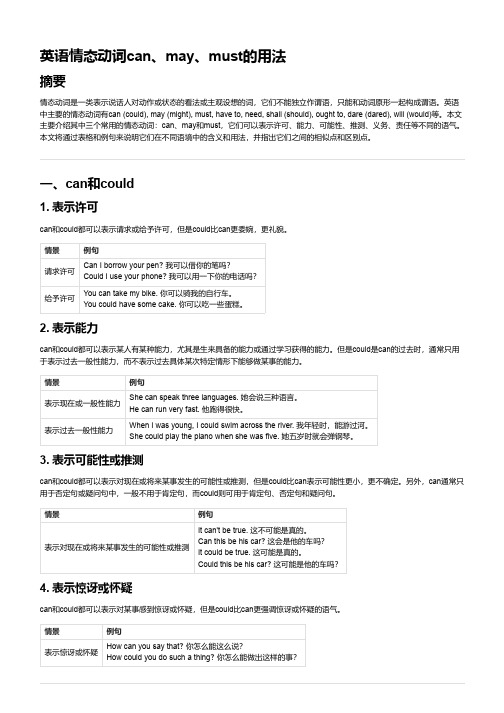
英语情态动词can、may、must的用法摘要情态动词是一类表示说话人对动作或状态的看法或主观设想的词,它们不能独立作谓语,只能和动词原形一起构成谓语。
英语中主要的情态动词有can (could), may (might), must, have to, need, shall (should), ought to, dare (dared), will (would)等。
本文主要介绍其中三个常用的情态动词:can、may和must,它们可以表示许可、能力、可能性、推测、义务、责任等不同的语气。
本文将通过表格和例句来说明它们在不同语境中的含义和用法,并指出它们之间的相似点和区别点。
一、can和could1. 表示许可can和could都可以表示请求或给予许可,但是could比can更委婉,更礼貌。
情景例句请求许可Can I borrow your pen? 我可以借你的笔吗?Could I use your phone? 我可以用一下你的电话吗?给予许可You can take my bike. 你可以骑我的自行车。
You could have some cake. 你可以吃一些蛋糕。
2. 表示能力can和could都可以表示某人有某种能力,尤其是生来具备的能力或通过学习获得的能力。
但是could是can的过去时,通常只用于表示过去一般性能力,而不表示过去具体某次特定情形下能够做某事的能力。
情景例句表示现在或一般性能力She can speak three languages. 她会说三种语言。
He can run very fast. 他跑得很快。
表示过去一般性能力When I was young, I could swim across the river. 我年轻时,能游过河。
She could play the piano when she was five. 她五岁时就会弹钢琴。
3. 表示可能性或推测can和could都可以表示对现在或将来某事发生的可能性或推测,但是could比can表示可能性更小,更不确定。
情态动词can,may,must与need的用法区别,一不小心就出错哦

情态动词can,may,must与need的用法区别,一不小心就出错哦(图上这个题,你是不是非常想选答案A?仔细考虑一下哦)情态动词是表示说话人的某种感情或语气的动词,用来表示请求、允诺、愿望、建议、命令、能力、需求或拒绝等情感态度。
1、情态动词的共同点:(1)情态动词有一定的词义,但不能单独做谓语,必须与实义动词或连系动词连用,构成谓语。
如:You may take whatever you like.你可以带走你喜欢的任何东西。
(can是情态动词,而take是实义动词)(2)情态动词一般无人称和数的变化,如:He must give up smoking. 他必须戒烟。
(must是情态动词,没有第三人称单数一般现在的形式,即,不能加-s)(3)情态动词后接动词原形。
如:She may lose her way.她可能迷路了。
(may是情态动词,lose 不能用loses, lost, losing等形式)(4)情态动词具有助动词的作用,可用来构成否定句、疑问句及用于简略回答。
如:Can you sing English songs?Yes, I can. (前面构成疑问句,后面作简略回答)2、May 的用法:(1)表示允许或征询对方许可,有“可以”的意思。
May not 表示说话人“不许可”。
如:May I use your computer? 我可以用你的电脑吗?You may not go.你不可以去(2)在回答may 引导的疑问句时,肯定回答用may,否定回答用can’t或mustn’t,can’t表示“不可以,不能”,mustn’t表示“不准”。
如:-May I smoke here?我可以在这儿抽烟吗?-Yes,you may. /No,you mustn't. 是的,你可以(不,你不准)。
(3)may表示推测,意思是“可能”,否定形式may not表示“可能不”。
You may be right. 你可能是对的。
最新中考情态动词讲解之can,may,must,should区别
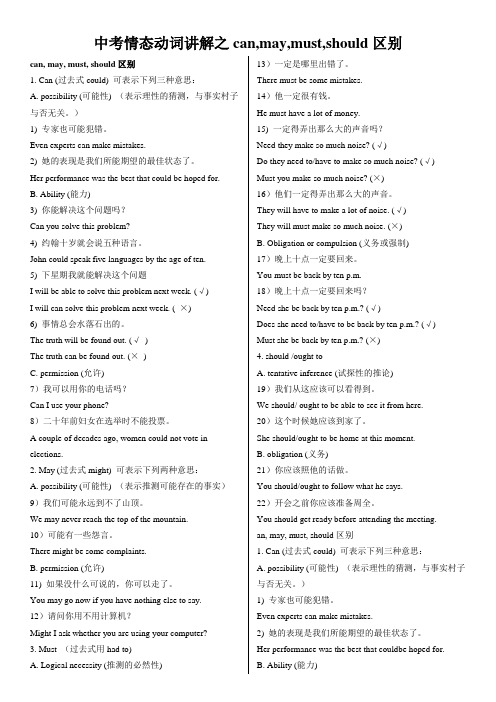
中考情态动词讲解之can,may,must,should区别can, may, must, should区别1. Can (过去式could) 可表示下列三种意思:A. possibility (可能性) (表示理性的猜测,与事实村子与否无关。
)1) 专家也可能犯错。
Even experts can make mistakes.2) 她的表现是我们所能期望的最佳状态了。
Her performance was the best that could be hoped for.B. Ability (能力)3) 你能解决这个问题吗?Can you solve this problem?4) 约翰十岁就会说五种语言。
John could speak five languages by the age of ten.5) 下星期我就能解决这个问题I will be able to solve this problem next week. (√)I will can solve this problem next week. ( ×)6) 事情总会水落石出的。
The truth will be found out. (√)The truth can be found out. (×)C. permission (允许)7)我可以用你的电话吗?Can I use your phone?8)二十年前妇女在选举时不能投票。
A couple of decades ago, women could not vote in elections.2. May (过去式might) 可表示下列两种意思:A. possibility (可能性) (表示推测可能存在的事实)9)我们可能永远到不了山顶。
We may never reach the top of the mountain.10)可能有一些怨言。
初一英语:情态动词canmustmay的用法

初一英语:情态动词can-must-may的用法————————————————————————————————作者:————————————————————————————————日期:学员编号:年级:初一课时数及课时进度:学员姓名:辅导科目:英语学科教师:学科组长/带头人签名及日期课题情态动词授课时间:备课时间:情态动词can,must,may的用法教学目标掌握三个情态动词的用法重点、难点掌握情态动词的用法并能灵活运用考点及考试要求教学内容Step 1: homework checking and dictationStep 2: 情态动词一、概念:情态动词是一种本身有一定的词义,表示说话人的情绪、态度或语气的动词,但不能单独作谓语,只能和其他动词原形构成复合谓语,没有人称和数的变化。
情态动词数量不多,但用途广泛,主要有:can (could), may (might), must, need, ought to, dare (dared), shall (should), will (would) .二、can/could1. 表示能力(如体力和脑力方面),意为“能、会”Can you speak Chinese?Can you play basketball?2. 表示请求或者允许,多用在口语中,意为“可以、能”等客观条件的允许。
用于疑问句中用来提出要求,用于否定句中表示不允许。
Can you help me?You can’t play the computer3. 表示可能,理论上的可能。
He can be out now.It can’t bu sunny all the time.4. 表示说话人的猜测、怀疑、不肯定等,主要用于否定句、疑问句、感叹句中,带哟感情色彩。
How can yo be so rude!Can he be back?5. could可以作为can的过去式,也可以在提出请求时表示委婉。
初三英语中考语法一轮复习讲义(二十五)can,may,must肯定否定疑问句用法总结与整理

初三英语中考语法一轮复习讲义(二十五)can,may,must肯定否定疑问句用法最全总结与整理can,may,must是三个最重要的情态动词,它们的基本句型如下所示:肯定句:主语+can,may,must+动词原形+……否定句:主语+can,may,must+not+动词原形+……疑问句:Can,May,Must+主语+动词原形+……?need也可以作情态动词,一般用于否定句和疑问句中。
1.can,may,must的肯定句Vince can speak English and a little German.(文斯会说英语和一点儿德语。
)There may be a shower,so bring an umbrella with you.(可能会有阵雨,带上伞吧。
)We must study hard.(我们必须努力学习。
)(1)can的肯定句A.can表示能力、许可、可能性。
表示能力时一般译为“能;会”,即有这种能力,尤指生下来就具备的能力。
Tommy can play the trumpet and draw pictures.(汤米会吹小号和画画。
)A robot can do many different things.(机器人能做许多不同的事情。
)They can do some shopping in Pedestrian Street of Nanjing Road. (他们可以在南京路步行街购物。
)Butterflies can see more colours than human can.(蝴蝶比人类能看到更多的颜色。
)重要:当can表示能力时,may和must都不可以代替它。
B.can只有现在式can和过去式could,在表示其他时态时,可以用be able to来代替。
I could (=was able to)(过去时)send e-cards before having the computer lessons.(在学计算机课之前我就会发送电子贺卡。
情态动词can、may、must的横向辨析

情态动词can、may、must的横向辨析英语情态动词对中国学生来说,确实是一个费解的语法项目。
其主要原因是中国学生缺少语境和意境;其次,课本和语法书只是逐个讲述每个情态动词的用法,缺少对每个情态动词之间意义上的横向比较。
为了帮助读者清晰地区分它们之间的差异,达到正确运用的目的,笔者就“can、may、must”三个情态动词进行横向对比。
一、表示“能力”。
l.只可用can(could)。
may、must则无此种含义。
例:①I can swim now,but I couldn’t last year.②Can you play me pianoYes,I can.2.can(could)适用于各种句型和人称。
例:①肯定句:I(You,He)can swim.②否定句:I(You,He)can’t swim.③疑问句:Can I(you,he)swim二、表示“请求”或“许可”。
can、may、must都可用,但语气和程度不同。
1.can(could)用于各种句型和大部分人称。
例:①肯定句:You(He,We)can go now.②否定句:You(He,We)can’t go now.③疑问句:Can I(you,he)go nowYes,you can.(No,you can’t.)2.may(might)用于各种句型,但在肯定句和否定句中不用于第一人称;在疑问句中不用于第二人称。
例:①肯定句:You(He)may go now.②否定句:You(He)may not go now.③疑问句:May I(he)go now正规回答:(表定)Yes,you may.( 否定)No,you may not.(No,you can’t./No,you mustn’t.口语化回答:(肯定)Yes,please.(Certainly.)(否定)No,please don’t.(No,of course not.)3.must用于各种句型和大部分人称。
初一英语:情态动词can-must-may的用法

4. 表示说话人的猜测、怀疑、不肯定等,主要用于否定句、疑问句、感叹句中,带哟感情色彩。
How can yo be so rude!Can he be back?5. could可以作为can的过去式,也可以在提出请求时表示委婉。
He could save the little boy.Could you help me?三、may, might1. 表示“许可、准许”,此时与can同义,可以互换使用You may/can go to the cinema this evening.☆注意:表许可时其答语可以用“Yes,you may.”但是由于用may做肯定回答语气显得生硬、严肃,因此一般用Yes, please. /Certainly. / Of course.这些回答显得热情、客气。
拒绝对方时,其答语可以用No, you mustn’t. / No, you can’t. / Sorry, you can’t. / No, please don’t等--May I come in? --Yes, please--May I use your ruler? --Certainly. Here you are.2. 表示可能性时,常用在肯定句中,意为“可能、也许”He may be very busy now.He said that she might not be at work today.3. can和may都可以表示推测。
Can通常用在否定句和疑问句中,may通常用在肯定句和否定句中。
虽然两者都可以用于否定句,但是程度不同,can’t的语气比may not更强。
It can’t be true.It may not be true.4. 表示希望、祈求、祝愿,常可以译为“祝愿”May you have a good time.May you be happy.5. might可以作为may的过去式,也可以在提出请求时表委婉;在表示可能性时,might的可能性比may 更小☆注意:can和may的区别1. can和may都可以表示“许可”,在征求对方意见时用may比较多May I go now?2. 在询问客观上是否可以时,用can Can we take the books out?3. 在两者都可以用时,may更客气一些。
情态动词may,can,must

情态动词may,can,must情态动词:本身有一定的词义,表示说话人的情绪、态度、语气,但不能单独做谓语,只能和其他动词原形构成谓语。
常见的情态动词有may,can,must,need 等。
1.may:表可能性,用于肯定句中,意为“可能”He may be a good father but he may not be a good husband.2.can:(1)意为“能,会”,表示能力,可指某人拥有某种能力例:She can cook.(2)意为“可以”,表示许可,常用语口语,可以用may替代例:Can I have a look?(3)意为“可能”,表示推测,常用于否定句和疑问句,此时“can’t为“不可能”例:This pen looks like mine,yet it isn’t.Whose can it be?这支笔看起来是我的,但它不是,它可能是谁的呢?Tom can’t be his brother,I know all of his brothers.Tom不可能是他的兄弟,我知道他所有的兄弟。
3.must:(1)表有把握的推测,用于肯定句,表示“一定,准是”例:May and Mary must be twins.They really look like each other. (2)其否定形式mustn’t表示“禁止,不准,不允许”例: You mustn’t swim in the lake.(3)对must引导的疑问句回答①肯定回答用must②否定回答用needn’t 或don’t have to例:---Must I finish my homework?我现在必须完成作业吗?---No, you needn’t./ No, you don’t have to. 不,你不必。
(3)must have done一定做过某事例:I see Dad’s car downstairs.He must have come home.(4)must的反义疑问句部分:助动词英语must后面的动词在非推测情况下的用法保持一致例:He must be a worker,isn’t he?You must have learned English for many years,haven’t you?练习:()1.You ______ be very tired after a 13-hour flight from New York to Shanghai.A.canB. mayC. mustD.need()2.-I can’t find my key.-It _____ locked in your room.A.mayB.maybeC.may beD.perhaps()3.-Who told him about this news?Lily?-It ____ her.She doesn’t know the news at all.A.can’t beB.mustn’t beC.shouldn’t beD.may not be()4. -Must I do my homework at once? --No,you _______.A. needn'tB. mustn'tC. can'tD. may not()5. The children___ play football on the road.A.can’tB. canC. mustn'tD. must()6. Even the top students in our class can't work out this problem, so it___ be very difficult.A.mayB. mustC. canD. need()7. -Can you speak Japanese? -No,you ________A.mustn’tB. can'tC. needn'tD. may not()8. He isn't at school. I think he ___ be ill.A.canB. willC. mustD. has to()9. —How long may I keep the book?—You ________ keep it for two weeks.A. mayB. mustC. will()10.-- May I go out now, Dad?-- No. You ______ let your mother know first.A. canB. mayC. needD. must。
can may must的用法
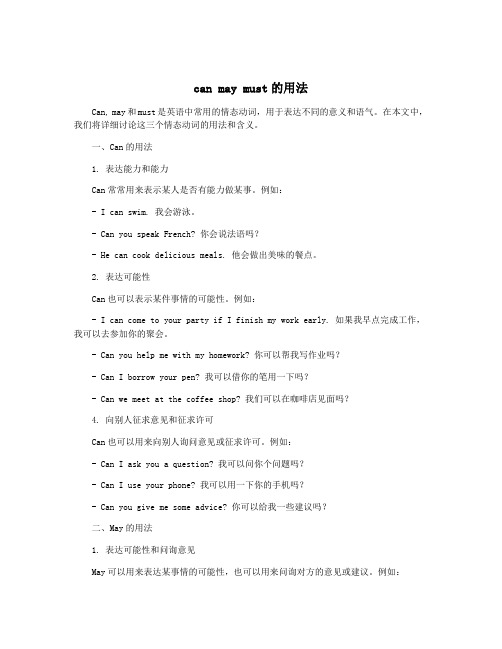
can may must的用法Can, may和must是英语中常用的情态动词,用于表达不同的意义和语气。
在本文中,我们将详细讨论这三个情态动词的用法和含义。
一、Can的用法1. 表达能力和能力Can常常用来表示某人是否有能力做某事。
例如:- I can swim. 我会游泳。
- Can you speak French? 你会说法语吗?- He can cook delicious meals. 他会做出美味的餐点。
2. 表达可能性Can也可以表示某件事情的可能性。
例如:- I can come to your party if I finish my work early. 如果我早点完成工作,我可以去参加你的聚会。
- Can you help me with my homework? 你可以帮我写作业吗?- Can I borrow your pen? 我可以借你的笔用一下吗?- Can we meet at the coffee shop? 我们可以在咖啡店见面吗?4. 向别人征求意见和征求许可Can也可以用来向别人询问意见或征求许可。
例如:- Can I ask you a question? 我可以问你个问题吗?- Can I use your phone? 我可以用一下你的手机吗?- Can you give me some advice? 你可以给我一些建议吗?二、May的用法1. 表达可能性和问询意见May可以用来表达某事情的可能性,也可以用来问询对方的意见或建议。
例如:- May I ask you a question? 我可以问你一个问题吗?- May I have your opinion on this matter? 我可以听听你对这个问题的看法吗?2. 征求许可和邀请May也可以用来征求许可或邀请别人做某事。
例如:- May I borrow your car? 我可以借用你的车吗?- May I have a glass of water? 我可以喝一杯水吗?- May I invite Jane to the party? 我可以邀请简来参加聚会吗?3. 表示礼貌在正式场合中,may也常常用来表达礼貌和尊重。
初一英语:情态动词can,must,may的用法

4. 表示说话人的猜测、怀疑、不肯定等,主要用于否定句、疑问句、感叹句中,带哟感情色彩。
How can yo be so rude!Can he be back?5. could可以作为can的过去式,也可以在提出请求时表示委婉。
He could save the little boy.Could you help me?三、may, might1. 表示“许可、准许”,此时与can同义,可以互换使用You may/can go to the cinema this evening.☆注意:表许可时其答语可以用“Yes,you may.”但是由于用may做肯定回答语气显得生硬、严肃,因此一般用Yes, please. /Certainly. / Of course.这些回答显得热情、客气。
拒绝对方时,其答语可以用No, you mustn’t. / No, you can’t. / Sorry, you can’t. / No, please don’t等--May I come in? --Yes, please--May I use your ruler? --Certainly. Here you are.2. 表示可能性时,常用在肯定句中,意为“可能、也许”He may be very busy now.He said that she might not be at work today.3. can和may都可以表示推测。
Can通常用在否定句和疑问句中,may通常用在肯定句和否定句中。
虽然两者都可以用于否定句,但是程度不同,can’t的语气比may not更强。
It can’t be true.It may not be true.4. 表示希望、祈求、祝愿,常可以译为“祝愿”May you have a good time.May you be happy.5. might可以作为may的过去式,也可以在提出请求时表委婉;在表示可能性时,might的可能性比may更小☆注意:can和may的区别1. can和may都可以表示“许可”,在征求对方意见时用may比较多 May I go now?2. 在询问客观上是否可以时,用can Can we take the books out?3. 在两者都可以用时,may更客气一些4. 在陈述句中用can比较多 You can sit here.5. can还可以表示能力,may无此用法6. 在否定句中一般不用may not,常用can’t表示不可能He can’t be at home tonight.四、must1. 表示“必须、一定要”,多强调说话人的主观看法(表示客观需要时,常用_____________)否定式mustn’t表示“一定不要,禁止”You must see the doctor.Must you go soon?对于must开头的一般疑问句,如果要做否定回答,可以用needn’t, don’t have to,不能用mustn’t --Must I come over tonight? --No, you needn’t2. 表示推测,意为“准是,一定是”,但是通常只用于肯定句,在否定句、疑问句中通常用can’t It must be true.Can it be true? It can’t be trueStep 3:Practice一、用can,may,must的适当形式填空1. __________ I ask you a question?2. Attending a ball __________ be exciting3. Michael __________ be a policeman, for he is mush too short.4. –Are you coming to Jeff’s party? --I’m not sure. I __________ go to the concert instead.5. He never takes a taxi. He __________ be very poor.6. I thought you __________ like something to read, so I brought you some books.7. Look! I __________ stand on my hands.8. He __________ have been to Shanghai.9. The play is not interesting. I really __________ go now.10. She __________ like this place.二、根据汉语提示给出下列句子的回答1. –Must we hand in our exercise books today?______________________________.(不,没有必要)2. Can I call you by your first name?______________________________(是的,可以)3. Could I come here again tomorrow?______________________________(是的,你可以来)4. Must we send in our pla this week?______________________________(是的,必须交)5. May I use you pen?______________________________(可以,给你)三、选择1. Helen __________ go on the trip with us, but she isn’t quite sure yet.A shallB mustC mayD can2. Johnny, you __________ play with the knife, you __________ hurt yourself.A won’t ,can’tB mustn’t, mayC shouldn’t , mustD can’t, shouldn’t3. A computer __________ think for itself; it must be told what to do.A can’tB couldn’tC may notD might not4. –Could I borrow your dictionary? --Yes, of course you __________.A mustB mightC canD could5. How __________ you say that you really understand the whole story if you have covered only a part of the article?A canB mustC needD may6. Oh, dear! What on earth __________ this mean?A couldB canC mayD might7. –Must I finish my homework today? --No, you __________.A can’tB needn’tC mustn’tD may not8. --__________ I speak to Mary? --Speaking.A MustB NeedC MayD Shall9. This match problem is too hard. Nobody __________ do it.A may notB mayC can’tD can10. –Can you speak Japanese? --No, I __________.A can’tB mustn’tC may notD needn’t四、在空格处填入适当的词,一空一词Tom: Excuese me. __________ you tell me the way to No. 3 Middle School?Wang Hai: __________, I’m a student there. I’m going to school now. You __________follow me.Tom: Thank you! I’m new in No. 3 Middle School. My name is Tom. __________ I know you name?W: Wang Hai. Why __________ your parents send you to school for the first time?1."Could I call you by your first name?""Yes,you___."A.willB.couldC.mayD.might选C,为什么不可以选B或D2.You___walk for miles and miles among the hills without meeting anyone.A.mustB.needC.mayD.should选C,为什么不能选D,推测的可能性会大一些3.I wasn't sure whether I___offer to help or not.A.shouldB.mightC.wouldD.needed选A 是不是因为虚拟语气?4.____someone get into trouble,please dial 110.A.ShouldB.IfC.ShallD.May选A,这种句型不太理解5.Why____it get colder when we go up a mountain?We are getting nearer to the sun!A.ought toB.wouldC.shouldD.must选C 为什么不选A~1,can may 表示许可,(could是can表示“能够,有能力做某事”时候的委婉语),所以could不可以,同时might既是may的过去时,也是may的委婉语,用might回答别人,在这里不礼貌2.这题缺少上下文,所以答案不是唯一的,看个人理解,出题人出的不够严密呀3.不是虚拟语气,虚拟语气主要2种用法(1,表示与现实不符合的假设;2,在建议,请求等词之后的从句里使用)4 should可以表示“非常不可能的可能性”,并且用这个意思的时候一般倒装:Should anyone phone (ie If anyone phones), please tell them I'm busy. 有人打电话来, 就说我很忙. ---当然打电话110不是什么好事,说的可能性小点比较符合文法5 这里should表示“竟然” 如果是ought to 那就是理所当然拉,不需要问句形式了。
英语词汇学习----can,may,must 等情态动词在陈述句中的用法

英语词汇学习----can,may,must 等情态动词在陈述
句中的用法
1. can 的用法:
(1)表示能力、许可、可能性。
表示能力时一般译为“能、会”,即有种能力,尤其是生来具备的能力.如:She can swim fast, but I can’t . 她能游得很快,但我不能。
(2)表示许可,常在口语中。
如:You can use my dictionary. 你可以用我的字典。
(3)表示推测,可能性,意为“可能”,常用于否定句和疑问句中,此时can’t 译为“不可能”。
如:
—Can it be our teacher?
那个人有可能是我们老师吗?
—No, it can’t be our teacher. He is on a visit to the Great Wall.不可能。
咱们老师正在游览长城呢。
(4)could的用法:
(1)can的过去式,意为“能、会”,表示过去的能力。
如:
He could write poems when he was 10.
他十岁时就会写诗。
(2). could在疑问句中,表示委婉的语气,此时could 没有过去式。
初中情态动词的用法总结
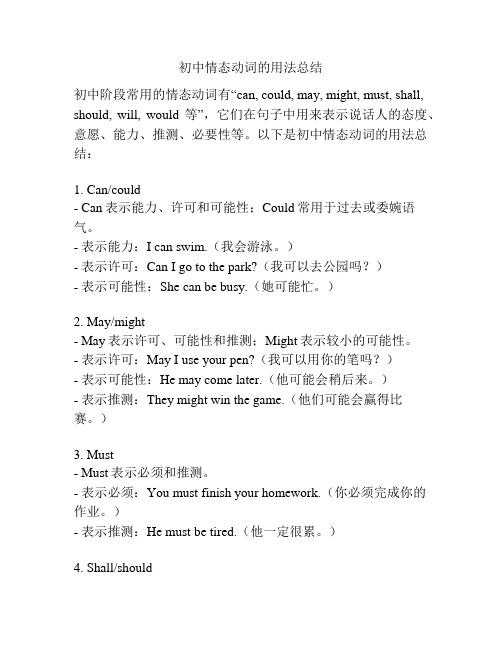
初中情态动词的用法总结初中阶段常用的情态动词有“can, could, may, might, must, shall, should, will, would等”,它们在句子中用来表示说话人的态度、意愿、能力、推测、必要性等。
以下是初中情态动词的用法总结:1. Can/could- Can表示能力、许可和可能性;Could常用于过去或委婉语气。
- 表示能力:I can swim.(我会游泳。
)- 表示许可:Can I go to the park?(我可以去公园吗?)- 表示可能性:She can be busy.(她可能忙。
)2. May/might- May表示许可、可能性和推测;Might表示较小的可能性。
- 表示许可:May I use your pen?(我可以用你的笔吗?)- 表示可能性:He may come later.(他可能会稍后来。
)- 表示推测:They might win the game.(他们可能会赢得比赛。
)3. Must- Must表示必须和推测。
- 表示必须:You must finish your homework.(你必须完成你的作业。
)- 表示推测:He must be tired.(他一定很累。
)4. Shall/should- Shall常用于第一人称,用来表达建议、命令、询问意愿等;Should表示应该、建议。
- 表示建议:You shall go to bed early.(你应该早点睡觉。
)- 表示命令:You shall not cheat in the exam.(你在考试中不得作弊。
)- 询问意愿:Shall we go for a walk?(我们出去散步好吗?)- 表示应该:You should take care of yourself.(你应该照顾好自己。
)5. Will/would- Will表示意愿、将来时和推测;Would常用于过去或委婉语气。
初中英语情态动词用法归纳
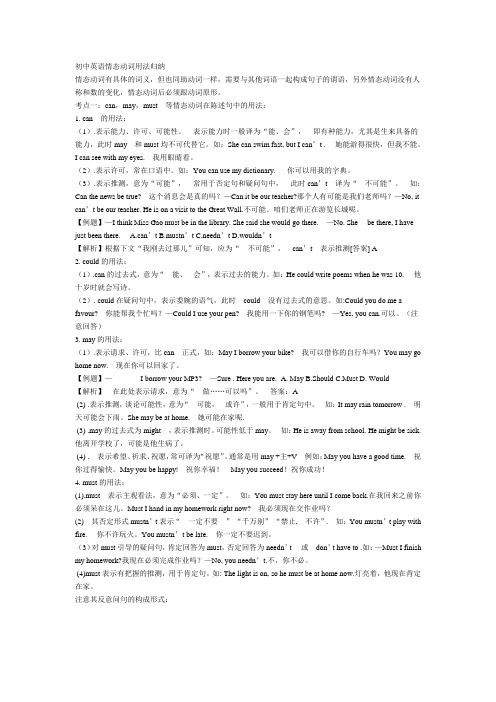
初中英语情态动词用法归纳情态动词有具体的词义,但也同助动词一样,需要与其他词语一起构成句子的谓语,另外情态动词没有人称和数的变化,情态动词后必须跟动词原形。
考点一:can,may,must等情态动词在陈述句中的用法:1. can的用法:(1).表示能力、许可、可能性。
表示能力时一般译为“能、会”,即有种能力,尤其是生来具备的能力,此时may和must均不可代替它。
如:She can swim fast, but I can’t . 她能游得很快,但我不能。
I can see with my eyes.我用眼睛看。
(2).表示许可,常在口语中。
如:You can use my dictionary. 你可以用我的字典。
(3).表示推测,意为“可能”,常用于否定句和疑问句中,此时can’t译为“不可能”。
如:Can the news be true?这个消息会是真的吗?—Can it be our teacher?那个人有可能是我们老师吗?—No, it can’t be our teacher. He is on a visit to the Great Wall.不可能。
咱们老师正在游览长城呢。
【例题】—I think Miss Gao must be in the library. She said she would go there.—No. She __be there, I have just been there. A.can’t B.mustn’t C.needn’t D.wouldn’t【解析】根据下文“我刚去过那儿”可知,应为“不可能”,can’t表示推测[答案] A2. could的用法:(1).can的过去式,意为“能、会”,表示过去的能力。
如:He could write poems when he was 10. 他十岁时就会写诗。
(2). could在疑问句中,表示委婉的语气,此时could没有过去式的意思。
初一英语:情态动词can,must,may的用法

4. 表示说话人的猜测、怀疑、不肯定等,主要用于否定句、疑问句、感叹句中,带哟感情色彩。
How can yo be so rude!Can he be back?5. could可以作为can的过去式,也可以在提出请求时表示委婉。
He could save the little boy.Could you help me?三、may, might1. 表示“许可、准许”,此时与can同义,可以互换使用You may/can go to the cinema this evening.☆注意:表许可时其答语可以用“Yes,you may.”但是由于用may做肯定回答语气显得生硬、严肃,因此一般用Yes, please. /Certainly. / Of course.这些回答显得热情、客气。
拒绝对方时,其答语可以用No, you mustn’t. / No, you can’t. / Sorry, you can’t. / No, please don’t等--May I come in? --Yes, please--May I use your ruler? --Certainly. Here you are.2. 表示可能性时,常用在肯定句中,意为“可能、也许”He may be very busy now.He said that she might not be at work today.3. can和may都可以表示推测。
Can通常用在否定句和疑问句中,may通常用在肯定句和否定句中。
虽然两者都可以用于否定句,但是程度不同,can’t的语气比may not更强。
It can’t be true.It may not be true.4. 表示希望、祈求、祝愿,常可以译为“祝愿”May you have a good time.May you be happy.5. might可以作为may的过去式,也可以在提出请求时表委婉;在表示可能性时,might的可能性比may 更小☆注意:can和may的区别1. can和may都可以表示“许可”,在征求对方意见时用may比较多May I go now?2. 在询问客观上是否可以时,用can Can we take the books out?3. 在两者都可以用时,may更客气一些4. 在陈述句中用can比较多You can sit here.5. can还可以表示能力,may无此用法6. 在否定句中一般不用may not,常用can’t表示不可能He can’t be at home tonight.四、must1. 表示“必须、一定要”,多强调说话人的主观看法(表示客观需要时,常用_____________)否定式mustn’t表示“一定不要,禁止”You must see the doctor.Must you go soon?对于must开头的一般疑问句,如果要做否定回答,可以用needn’t, don’t have to,不能用mustn’t --Must I come over tonight? --No, you needn’t2. 表示推测,意为“准是,一定是”,但是通常只用于肯定句,在否定句、疑问句中通常用can’tIt must be true.Can it be true? It can’t be trueStep 3:Practice一、用can,may,must的适当形式填空1. __________ I ask you a question?2. Attending a ball __________ be exciting3. Michael __________ be a policeman, for he is mush too short.4. –Are you coming to Jeff’s party? --I’m not sure. I __________ go to the concert instead.5. He never takes a taxi. He __________ be very poor.6. I thought you __________ like something to read, so I brought you some books.7. Look! I __________ stand on my hands.8. He __________ have been to Shanghai.9. The play is not interesting. I really __________ go now.10. She __________ like this place.二、根据汉语提示给出下列句子的回答1. –Must we hand in our exercise books today?______________________________.(不,没有必要)2. Can I call you by your first name?______________________________(是的,可以)3. Could I come here again tomorrow?______________________________(是的,你可以来)4. Must we send in our pla this week?______________________________(是的,必须交)5. May I use you pen?______________________________(可以,给你)三、选择1. Helen __________ go on the trip with us, but she isn’t quite sure yet.A shallB mustC mayD can2. Johnny, you __________ play with the knife, you __________ hurt yourself.A won’t ,can’tB mustn’t, mayC shouldn’t , mustD can’t, shouldn’t3. A computer __________ think for itself; it must be told what to do.A can’tB couldn’tC may notD might not4. –Could I borrow your dictionary? --Yes, of course you __________.A mustB mightC canD could5. How __________ you say that you really understand the whole story if you have covered only a part of the article?A canB mustC needD may6. Oh, dear! What on earth __________ this mean?A couldB canC mayD might7. –Must I finish my homework today? --No, you __________.A can’tB needn’tC mustn’tD may not8. --__________ I speak to Mary? --Speaking.A MustB NeedC MayD Shall9. This match problem is too hard. Nobody __________ do it.A may notB mayC can’tD can10. –Can you speak Japanese? --No, I __________.A can’tB mustn’tC may notD needn’t四、在空格处填入适当的词,一空一词Tom: Excuese me. __________ you tell me the way to No. 3 Middle School?Wang Hai: __________, I’m a student there. I’m going to school now. You __________follow me. Tom: Thank you! I’m new in No. 3 Middle School. My name is Tom. __________ I know you name?W: Wang Hai. Why __________ your parents send you to school for the first time?T: Well, I prefer doing things by myself. However, I’m lucky today. You are so helpful. Thank you!W: It’s a pleasure. We are schoolmates now. __________ you please help me with my English?T: __________! I’m weak in Chinese, __________ you teach me Chinese?W: Sure! Let’s help each other.T: Good idea!W: By the way, how do you like Chinese traditional music?T: Very much! Erhu, dizi, and pipa sound really wonderful.W: There is going to __________ a Chinese traditional music concert at the Capital Satdium. I’ve got two tickets. Would you like to come?T: __________ love to . thanks so much!W: Don’t mention it!Step 4:more practiceHomework一、单项选择4. As we know, fish ______ die out of water.A. mayB. is going toC. canD. will5. –Can you answer my question, Lily? –Yes, I ______.A. mayB. needC. mustD. can6. –Excuse me, ______ you tell me the way to the nearest bus station?--Sorry, I can’t. I’m a stranger here.A. canB. needC. mustD. may10. After such a long journey, the children ______ be very tired now.A. canB. mustC. have toD. need1."Could I call you by your first name?""Yes,you___."A.willB.couldC.mayD.might选C,为什么不可以选B或D2.You___walk for miles and miles among the hills without meeting anyone.A.mustB.needC.mayD.should选C,为什么不能选D,推测的可能性会大一些3.I wasn't sure whether I___offer to help or not.A.shouldB.mightC.wouldD.needed选A 是不是因为虚拟语气?4.____someone get into trouble,please dial 110.A.ShouldB.IfC.ShallD.May选A,这种句型不太理解5.Why____it get colder when we go up a mountain?We are getting nearer to the sun!A.ought toB.wouldC.shouldD.must选C 为什么不选A~1,can may 表示许可,(could是can表示“能够,有能力做某事”时候的委婉语),所以could不可以,同时might既是may的过去时,也是may的委婉语,用might回答别人,在这里不礼貌2.这题缺少上下文,所以答案不是唯一的,看个人理解,出题人出的不够严密呀3.不是虚拟语气,虚拟语气主要2种用法(1,表示与现实不符合的假设;2,在建议,请求等词之后的从句里使用)4 should可以表示“非常不可能的可能性”,并且用这个意思的时候一般倒装:Should anyone phone (ie If anyone phones), please tell them I'm busy. 有人打电话来, 就说我很忙. ---当然打电话110不是什么好事,说的可能性小点比较符合文法5 这里should表示“竟然” 如果是ought to 那就是理所当然拉,不需要问句形式了。
- 1、下载文档前请自行甄别文档内容的完整性,平台不提供额外的编辑、内容补充、找答案等附加服务。
- 2、"仅部分预览"的文档,不可在线预览部分如存在完整性等问题,可反馈申请退款(可完整预览的文档不适用该条件!)。
- 3、如文档侵犯您的权益,请联系客服反馈,我们会尽快为您处理(人工客服工作时间:9:00-18:30)。
【中考演练】
•(1) —May I change the film here? (广 州.2013) —No, you___do that in the sunshine. A. needn’t B. don’t have to C. can’t D. may not
•(2) ---Listen! Somebody is singing in the next room. Who ____ it be? Is it Meihua?(深圳) ---No. It ____ be her. She is at school now.
duang!
• May he be Zhou Jielun? can't • It ________ be Zhou must jielun. • It _______ be Jacky Cheng .
• • • •
Can she be Miss Li? can't be Miss Li. She_____ Who must she be? must be Angela She_____ Baby.
Hi and Lo are talking about themselves. What are they saying? Read their conversation and then complete the statements below with Can or Cannot. P77
1. Hi _____ can play football.
Daisy is not feeling well today. Benny is at home with her. Read their conversation below. Fill the blanks with may or can. P78
Benny: How are you feeling, Daisy? Daisy: Not very well. Benny: May/Can ____________ I get you a chair? Daisy: Yes, thanks. Benny: I’m going out. May _____ I borrow your bicycle, Daisy? Daisy: Yes, you may. Before you go to meet your friends, can you come and see the doctor with me?
• 观察:
can
• I can swim. Can you swim? • I can't /cannot swim, but I can ski.
有能力做某事 • 总结: 原形 • 1.can表示__________. can't cannot • 2.can 后面动词用________. 提前 • 3. can的否定形式是:_______ 或
Grammar
can may must
情态动词: can may must
• • • • • • 定义: 本身具有一定的词义,表示某种感情和语气。 例句: You can’t do it like that.(责备) May I borrow your book?(请求) You must finsh your homework on time.(命令)
can _____ MayI carry your bag for you? Benny: Yes. I ____. Daisy: Yes, you may. That’s so kind of you, Benny. I’m ready to go. _____ you open the door for Can me? Benny: Yes, I can. Daisy: Thanks.
2. Lo _______ cannot paint.
3. Hi _______ cannot speak as many languages as Lo. 4. Both Hi and Lo _____ can dance. 5. Lo ______ cannot drive a car, but he ____ can play chess. 6. Hi ____ can swim, but he _______ cannot play the guitar.
1. I must drink more water. I must go to bed early. 2. ______________________________ 3. ______________________________ I must take the medicine on time. 4. I must not _____________________ eat cold food. 5. ______________________________ I must not go out alone. I must not share cups with others. 6. ______________________________
May I ask you a question?
Sure.
teacher
c. A boy is thirsty. He is asking his mother for something. May I have a glass of water?
Here you are.
his mother
You enter a shop. The girl will say...
What would he say if he wants to be polite?
a. A man is going to see his boss. b.He is standing at the doorway. May I come in?
Come in, please.
boss
A student is going to ask the teacher a question.
at school. on the wall outside the school on the paper
at night in the KTV
•A: I can ___________. Can/May I ________________? •B: No, you can't/ may not. You mustn't _________________________. _________ may /must__________________ You must /may_____________________st
A
B
can/may/must的双面性
•观察: 1. He may be Tom. Because he looks as tall as Tom. But I am not sure. 2. -Can the story be true? -It can't be true. He lied. 3. He must be at home. Look! The lights are on. •总结: 推测 •1.can/may/must还可以用来表示_________. must---may/can •2.可能性由大到小的排序:________________. can't •3. must表示一定,其“不可能”是: __________ can •4. 表示可能时,________ 不用于肯定句。
•can/may/must 共同点: •1.__________________________________ 后面动词都用原形。 否定句都是后面加not •2.__________________________________ •3.__________________________________ 一般疑问句都是将其提前 •不同之处: 有能力做某事/请求、允许 •1. can表示_________ 请求 /允许 may表示: ________ 禁止 命令、 must 表示: __________ 什么问,什么答 •2. can/may 提问遵循:_________ needn't/don't have to must 提问,否定回答: _________________
•观察: May/Can I use your mobile phone? Yes, you may/can. No, you may not/can't.
can/may
You may/can turn on the TV. You may not/cannot play in the kitchen. •总结: 允许 后接:_______ 原形 •1:can/may表示:请求 ____和_____. can't/cannot •2: can的否定形式:____________ may not may 的否定形式: ________
Daisy saw a doctor. The doctor told her what to do and what not to do. Help her write down the doctor’s instructions.
drink more water eat cold food go out alone go to bed early share cups with others take the medicine on time
小结:
Exercises
I.根据中文意思完成句子。
1. 我会游泳但玛丽不会。 I _____ can _____ swim but Mary _______. can't 2. 我八点之前必须完成作业。 must _____ finish my homework before eight o’clock. I _____ 3. 我可以借用你的自行车吗? May ___ I borrow ? _____ 4. 你不可以在这里打篮球。 You ________ mustn’t _____ play _________ basketball here. 5. -Must I stay here now? needn't You _______ No you _______. may/canleave now. -____,
